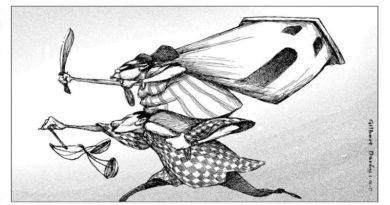EDITORIAL – BANGKOK POST: A law inviting contempt
Two recent cases involving criticism of the judiciary by two academics have sparked questions over what constitutes contempt of court. The debate centres on provisions in two laws governing court procedures.
Given their legal sensitivity and the potential implications they could have for members of the public, these legal provisions demand constructive debate as well as parliamentary review.
The cases involve responses of political scientist Kovit Wongsurawat and financial expert Sarinee Achavanuntakul to court decisions against MPs in media shareholding cases.
———
ADS by Cloud 9:
.
– SPACE RESERVE FOR YOUR ADVERTISEMENT –

.
Yesterday, Mr Kovit gave statements to the Constitutional Court over his tweet in July commenting on the court’s decision to accept a petition against 32 government coalition MPs but declining to suspend them from duty. He tweeted that the decision was beyond “thick-skinned”. Earlier, the court suspended Future Forward Party leader Thanathorn Juangroongruangkit as an MP after accepting a similar case against him.
The court deemed Mr Kovit’s comments “inappropriate”. If the court decides to proceed with the case against Mr Kovit, it will be the first trial involving the “contempt of court” provision under the organic law governing the Constitutional Court’s procedures. The new law took effect in March last year.
———
ADS by Cloud 9:
.
– SPACE RESERVE FOR YOUR ADVERTISEMENT –

.
Drafted by the military-appointed National Legislative Assembly (NLA), it bestows the court with unprecedented power to take legal action against anyone who comments on its rulings in a “dishonest manner” or with “rude, sarcastic or malicious” words or meaning.
———
ADS by Cloud 9:
.
– SPACE RESERVE FOR YOUR ADVERTISEMENT –

.
The law makes such criticism punishable by up to one month in prison and a 50,000-baht fine. It also allows the court to initiate and conclude cases without going through the entire judicial process.
Given that the Constitutional Court has previously ruled in cases of high-profile political disputes or to keep government in check, the NLA-approved law poses a threat to electoral democracy.
The NLA should have limited contempt-of-court provisions to obstruction of justice. Current lawmakers need to review this law’s restrictions on judicial criticism, since it will do more harm than good to citizens.
Ms Sarinee, meanwhile, is already facing a contempt-of-court case brought by the Supreme Court’s Election Cases Division under the Civil Procedure Code — a law which has existed for decades.
———
ADS by Cloud 9:
.
– SPACE RESERVE FOR YOUR ADVERTISEMENT –

.
She is due to testify in court on Sept 9. The case stems from her newspaper column on the court’s disqualification of a Sakhon Nakhon FFP electoral candidate earlier this year for links with a media business.
In its memo, the court said it considered her comments an “inaccurate and partial” account of the case and an “unfair” criticism which constitutes contempt of court under the law.
The Criminal Code also makes any criticism of courts deemed “insults” punishable.
The judiciary has long been spared the criticisms levelled at the legislative and administrative branches, since people fear the legal consequences of speaking out on judicial matters.
However, allowing the public to air views on court decisions would serve to strengthen people’s trust and acceptance of the judiciary. In the case of the Constitutional Court, it may also enrich the public participation that is vital to democracy. Thailand is in dire need of constructive debate on this issue, along with serious consideration of legal amendments. There is no better place to kick-start this process than with parliament and our elected representatives.
EDITORIAL
BANGKOK POST EDITORIAL COLUMN
———
ADS by Cloud 9:
.
– SPACE RESERVE FOR YOUR ADVERTISEMENT –

.
 All photographs, news, editorials, opinions, information, data, others have been taken from the Internet ..aseanews.net | [email protected]
All photographs, news, editorials, opinions, information, data, others have been taken from the Internet ..aseanews.net | [email protected]
For comments, Email to :D’Equalizer | [email protected] | Contributor
.










